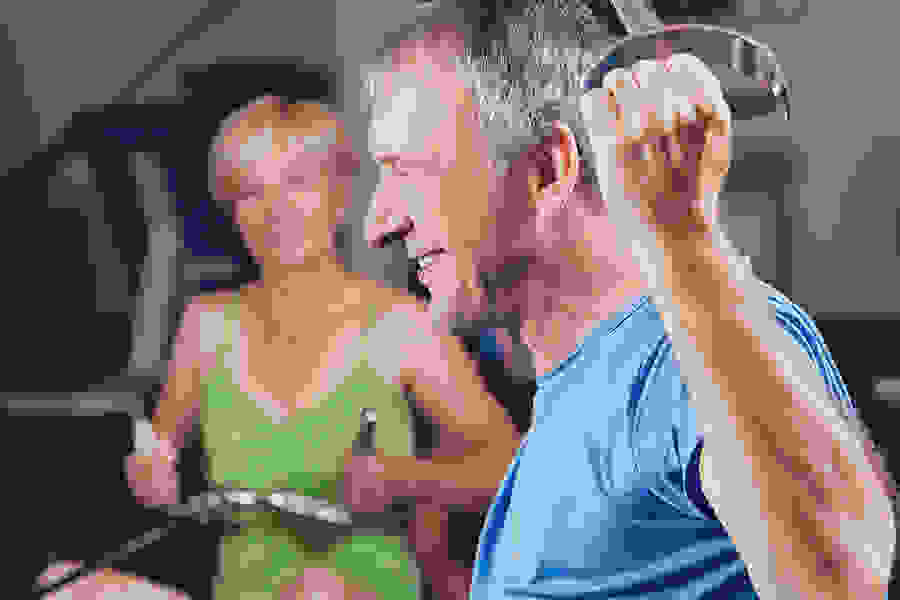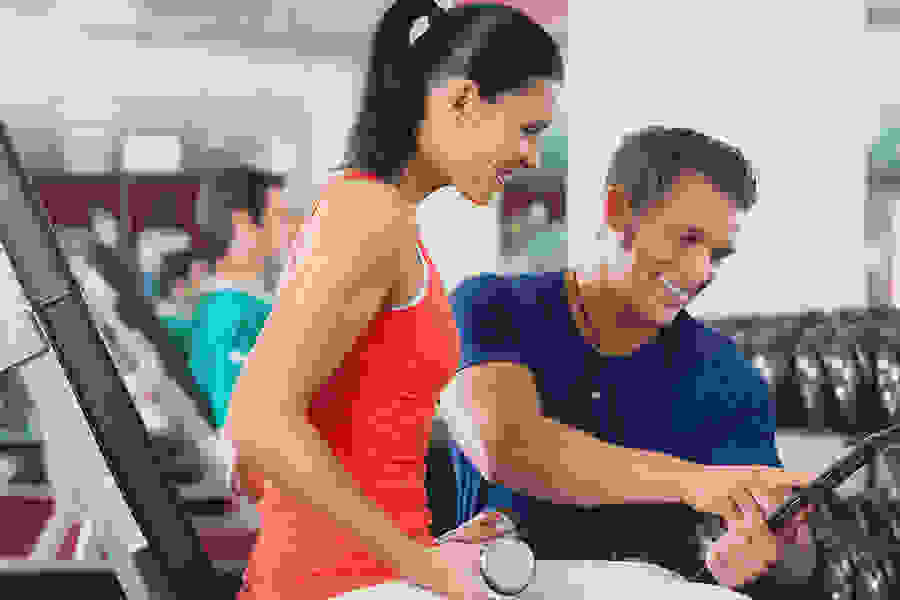Exercise increases blood flow and oxygen levels in the brain. It also encourages the release of the brain chemicals (hormones) that are responsible for the production of cells in the hippocampus, the part of the brain that controls memory and learning. This, in turn, boosts concentration levels and cognitive ability, and helps reduce the risk of cognitive degenerative diseases such as Alzheimer’s.
Exercise increases energy levels
Exercise improves both the strength and the efficiency of your cardiovascular system to get the oxygen and nutrients to your muscles. When your cardiovascular system works better everything seems easier and you have more energy for the fun stuff in life.
Exercise improves muscle strength
Staying active keeps muscles strong and joints, tendons and ligaments flexible, allowing you to move more easily and avoid injury. Strong muscles and ligaments reduce your risk of joint and lower back pain by keeping joints in proper alignment. They also improve coordination and balance.
The more you exercise, the more calories you burn. In addition, the more muscle you develop, the higher your metabolic rate becomes, so you burn more calories even when you’re not exercising. See our page: Activities for more information.
The more you exercise, the more calories you burn. In addition, the more muscle you develop, the higher your metabolic rate becomes, so you burn more calories even when you’re not exercising. The result? You may lose weight and look better physically which will boost your self-esteem.
Exercise increases blood flow and oxygen levels in the brain. It also encourages the release of the brain chemicals (hormones) that are responsible for the production of cells in the hippocampus, the part of the brain that controls memory and learning. This, in turn, boosts concentration levels and cognitive ability, and helps reduce the risk of cognitive degenerative diseases such as Alzheimer’s.
Exercise reduces LDL cholesterol (the type that clogs your arteries), increases HDL (the good cholesterol) and reduces blood pressure so it lowers the stress on your heart. Added to this, it also strengthens your heart muscle. Combined with a healthy diet, exercise lowers the risk of developing coronary heart disease.
Regular exercise lowers your risk of developing type 2 diabetes
Regular exercise helps to control blood glucose levels, which helps to prevent or delay the onset of type 2 diabetes. Additionally exercise helps to prevent obesity, which is a primary factor in the development of type 2 diabetes.
Exercise enhances your immune system
Exercise improves your body’s ability to pump the oxygen and nutrients around your body that are required to fuel the cells that fight bacteria and viruses.
Staying active reduces the likelihood of developing some degenerative bone diseases
Weight bearing exercise such as running, walking or weight training lowers your risk of both osteoarthritis and osteoporosis – the adage of “use it or lose it” really does apply to bones. Exercise may help to reduce the risk of certain cancers
Being fit may mean that the risks of colon cancer, breast cancer and possibly also lung and endometrial cancers are reduced. Studies by the Seattle Cancer Research Centre have suggested that 35% of all cancer deaths are linked to being overweight and sedentary. Active people tend to sleep better
Physical activity makes you more tired so you’re more ready to sleep. Good quality sleep helps improve overall wellness and can reduce stress.
See our page The Importance of Sleep for more information. Exercise improves your mood and gives you an improved sense of well-being
Physical activity stimulates the release of endorphins which make you feel better and more relaxed. These in turn improve your mood and lower your stress levels. Exercise can help prevent and treat mental illnesses like depression
Physical activity can help you meet people, reduce stress levels, cope with frustration, give you a sense of achievement, and provide some important “me time”, all of which help with depression. Keeping fit can reduce some of the effects of aging
As we age, we naturally begin to wonder how our limits change. Conventional wisdom is that you can still be strong as you age, but your recovery ability goes down, preventing you from exercising as hard as you used to. This is probably conventional wisdom for good reason, as you have fewer resources in the body to repair the damage done from exercise.
So what is the best way to work out for older adults? A recent study at the University of Alabama at Birmingham was conducted to determine at least a part of that answer. How often should older individuals be exercising for best results?
In the study, each participant was female and aged 60 or over, and placed in one of three groups. One group trained once per week doing aerobic work, and once doing resistance training (1 + 1). The second group did two days of each (2 + 2). And, you guessed it; the third group did three days of each (3 + 3). The researchers then measured various forms of energy expenditure and a few other variables.
Everyone talks about getting “healthier”. But it’s tough isn’t it? Especially when there are so many different ideas on what being “healthier” even means. If you are anything like me, none of these new health crazes understand the modern girl’s lifestyle. We don’t need a bikini body or to exercise till our eyeballs bleed. Nor do we want to beef up, bronze up or give up delicious cake. We just want to feel good and keep that muffin top at bay right? That, and truly rock a wiggle dress! Busy modern women, do not stress, here are my top 10 tips to get you healthier while keeping your sanity.
1. Get more greens! Green vegetables are the powerhouses of the food world, packed with vitamins, minerals and chlorophyll (that’s the green bit), most of which are destroyed during cooking. The solution? Go raw. Better yet, juice or smoothie your greens to get the most into you and out of your veggies. Chlorophyll is amazing for your liver; it helps it work more efficiently. And that means you can process toxins better. A better functioning liver means less weight gain, less body odour and less nasty hangovers. Try my green smoothie recipe to help you get more greens in. If a smoothie is still too hard for you, you can take a tablespoon of liquid chlorophyll supplement each day instead.
2. Avoid wheat. Modern day wheat is not what our grand
The way we modify, farm and process it robs it of any nutrients. It’s just bum glue. And it will do you no good. Right now, go to your cupboard and throw out anything with wheat in it. Get rid of store bought cakes, breads, biscuits, pasta and flour. Replace it with buckwheat (related to rhubarb not wheat), brown rice, quinoa and spelt.
3. Drink Up! Water is the cheapest, best and most under-utilised anti-aging product ever. Seriously. Drinking more water will plump up your cells and literally push those wrinkles out. But how much is enough? Well you need 1 litre per 24kg of your body weight. For an average 70kg chick, you’re looking at 2.9 litres per day. I know it sounds like a lot, but Rome wasn’t built in a day. Keep working at it and you’ll be surprised at how quickly you will adapt and a high water intake will become your norm.
4. Keep bloating at bay. No one wants a pot belly food baby! Try the following:
- eat light meals, avoiding heavy carbohydrates like rice, pasta and bread
- drink warm water with a little lemon or apple cider vinegar squeezed in it
- take a high quality probiotic tablet
- drink peppermint, chamomile and/or fennel tea
5. Eat fat. It is a common misconception that eating fat makes you fat. Not true. Eating sugar and processed foods, stressing and sitting on you bum all day will make you fat. Eating fat however, will keep you trim and happy, because fat is needed to produce all your happy hormones. Include good fats like nuts, seeds, olive and coconut oils, avocados and small amounts of organic meat, fish and dairy into your diet every day.
6. Exercise. Exercise releases endorphins. Endorphins are those little things that run around your body and make you happy. And when you are happy, you don’t want to staple thing to people’s heads. Planned exercise is a great thing. I find scheduling a class at least once a week keeps me accountable because there are always people who will call me out on not turning up! Things like Zumba, yoga, pilates, body balance or pole dancing classes are fun and make you feel a bit sexy too.
7. At least move your body. With a life to live, you’re a busy chick. Sometimes it’s hard to make it to the gym or a class. Don’t mean you can’t still get some exercise in. The trick is to work it into your routine. Park your car further away from the shops, take the stairs to the office, address your mail standing up. Get creative and you will find a million and one ways you can get a bit more movement in your day.
8. Stress less. Feeling stressed causes the release of a hormone called cortisol, which in small doses is good for you, but when it hangs around too long, say the amount of time it takes to plan a wedding, it can hurt rather than help. Too much cortisol:
• suppresses your immune system, making you get sick easier
• makes you crave fatty and sugary foods
• damages the brain cells responsible for long term memory formation
Make sure you take some time out for yourself to make sure you don’t become fat, sick and forgetful.



